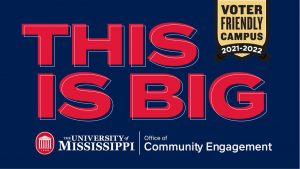OXFORD, Miss. – The University of Mississippi has been designated as a Voter Friendly Campus this semester, a recognition given to campuses nationwide that plan and implement practices to encourage students to register and vote.
The designation comes as a result of the work of voting ambassadors across campus and the Division of Diversity and Community Engagement. UM joins 234 other campuses designated as a Voter Friendly Campus this year.
 “We are excited about this designation and what it means for our campus,” said Erin Payseur Oeth. “Voting is a fundamental civic practice. The work we’ve been recognized for ensures that students on our campus have support in understanding how to participate in the electoral process and prepares them to be an active and informed citizen.”
“We are excited about this designation and what it means for our campus,” said Erin Payseur Oeth. “Voting is a fundamental civic practice. The work we’ve been recognized for ensures that students on our campus have support in understanding how to participate in the electoral process and prepares them to be an active and informed citizen.”
The Office of Community Engagement began planning in January 2020 to increase voter education and registration on campus. With the student-led Voting Ambassador program, students networked with faculty and student organizations to provide voter education presentations, help navigate the registration process and discuss the 2020 ballot issues.
When the pandemic began in March, those efforts moved online, but continued. Similarly, faculty champions led discussions about voting and encouraged students to register. All these efforts were coordinated with the voting roundtable, a committee of faculty, staff and students that led the planning efforts.
Libby Foley, junior public policy leadership major from Walpole, Massachusetts, is a voting ambassador. She said the program has opened her eyes to the voter inequities that exist across the country.
“It’s important that people are voting so that our policies reflect what people want,” Foley said. “These past few years show people want to be engaged more, and our programs give people the tools because voting can be very confusing. We’re helping people exercise their right to vote.”
Katelyn Winstead, a junior public policy leadership and philosophy double major from Ocean Springs, began her voter outreach as a voting ambassador and has since taken on a team leader role at the Andrew Goodman Foundation, a nonpartisan voting and civil rights advocacy group.
Winstead got involved in voter outreach because she believes that for society to be fairly represented in political leadership, citizens must exercise their right to vote.
“Our representatives are just that: representatives of us,” she said. “We have to use our voices to progress our society and policies and to shape them how we as a people see fit.”
Eliot Parker, an instructor in writing and rhetoric, became a faculty champion after asking his students to watch the Office of Community Engagement’s education videos and adding a response assignment for extra credit. He serves as the faculty liaison to the voting roundtable.
“I think our greatest gift as a country –and we certainly have some negative with the positive – but our greatest gift as Americans is that we get to choose our leaders, and we can vote out those we think aren’t representing us,” Parker said. “It’s a privilege that gets taken for granted and it’s our responsibility to make sure the next generation knows how important the process is and how important knowing who you are voting for is because they will be representing you.”
To be considered for the designation, the Fair Elections Center’s Campus Vote Project and NASPA – Student Affairs Administrators in Higher Education, evaluated the campus based on how it registers, educates and facilitates voter engagement efforts as well as student voter turnout. This year, campuses were also evaluated for how they responded during COVID-19.
Oeth said that while she is grateful for the recognition, the designation is only a milestone on a longer journey.
“Our work is not done,” she said. “But this designation does symbolize our commitment to continue to work on our campus to ensure that every eligible student has the opportunity and the knowledge they need to participate.”